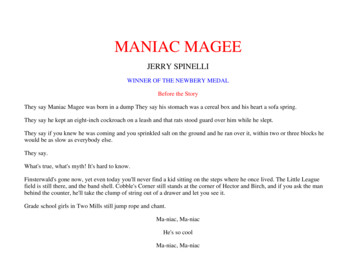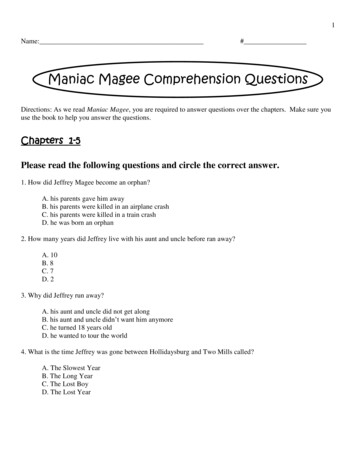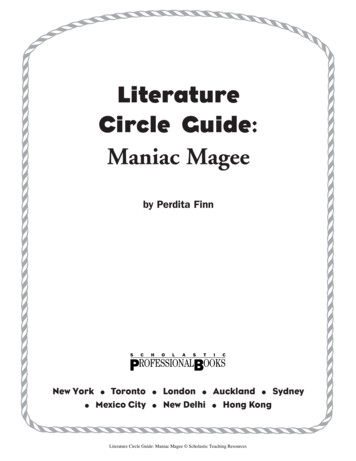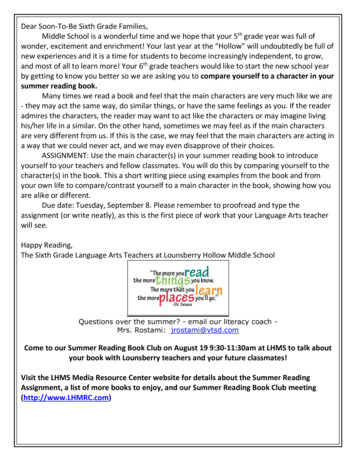
Transcription
MANIAC MAGEEJERRY SPINELLIWINNER OF THE NEWBERY MEDALBefore the StoryThey say Maniac Magee was born in a dump They say his stomach was a cereal box and his heart a sofa spring.They say he kept an eight-inch cockroach on a leash and that rats stood guard over him while he slept.They say if you knew he was coming and you sprinkled salt on the ground and he ran over it, within two or three blocks hewould be as slow as everybody else.They say.What's true, what's myth! It's hard to know.Finsterwald's gone now, yet even today you'll never find a kid sitting on the steps where he once lived. The Little Leaguefield is still there, and the band shell. Cobble's Corner still stands at the corner of Hector and Birch, and if you ask the manbehind the counter, he'll take the clump of string out of a drawer and let you see it.Grade school girls in Two Mills still jump rope and chant.Ma-niac, Ma-niacHe's so coolMa-niac, Ma-niac
Don't go to schoolRuns all nightRuns all rightMa-niac, Ma-niacKissed a bull!And sometimes the girl holding one end of the rope is from the West side of Hector, and the girl on the other end is from theEast side; and if you're looking for Maniac Magee's legacy, or monument, that's as good as any -- even if it wasn't really abull.But that's okay, because the history of a kid is one part fact, two parts legend, and three parts snowball. And if you want toknow what it was like back when Maniac Magee roamed these parts, well, just run your hand under your movie seat and bevery, very careful not to let the facts get mixed up with the truth.PART I1Maniac Magee was not born in a dump. He was born in a house, a pretty ordinary house, right across the river from here, inBridgeport. And he had regular parents, a mother and a father.But not for long.One day his parents left him with a sitter and took the P & W high-speed trolley into the city. On the way back home, theywere on board when the P & W had its famous crash, when the motorman was drunk and took the high trestle over theSchuylkill River at sixty miles an hour, and the whole kaboodle took a swan dive into the water.And just like that, Maniac was an orphan. He was three years old.
Of course, to be accurate, he wasn't really Maniac then. He was Jeffrey. Jeffrey Lionel Magee. Little Jeffrey was shipped offto his nearest relatives, Aunt Dot and Uncle Dan. They lived in Hollidaysburg, in the western part of Pennsylvania.Aunt Dot and Uncle Dan hated each other, but because they were strict Catholics, they wouldn't get a divorce. Around thetime Jeffrey arrived, they stopped talking to each other. Then they stopped sharing.Pretty soon there were two of everything in the house. Two bathrooms. Two TVs. Two refrigerators. Two toasters. If it werepossible, they would have had two Jeffreys. As it was, they split him up as best they could. For instance, he would eat dinnerwith Aunt Dot on Monday, with Uncle Dan on Tuesday, and so on.Eight years of that.Then came the night of the spring musicale at Jeffrey's school. He was in the chorus. There was only one show, and oneauditorium, so Aunt Dot and Uncle Dan were forced to share at least that much. Aunt Dot sat on one side, Uncle Dan on theother.Jeffrey probably started screaming from the start of the song, which was "Talk to the Animals," but nobody knew it becausehe was drowned out by all the other voices. Then the music ended, and Jeffrey went right on screaming, his face bright red bynow, his neck bulging. The music director faced the singers, frozen with his arms still raised. In the audience faces began tochange. There was a quick smatter of giggling by some people who figured the screaming kid was some part of the show,some funny animal maybe. Then the giggling stopped, and eyes started to shift and heads started to turn, because noweverybody could see that this wasn't part of the show at all, that little Jeffrey Magee wasn't supposed to be up there on therisers, pointing to his aunt and uncle, bellowing out from the midst of the chorus: "Talk! Talk, will ya! Talk! Talk! Talk!"No one knew it then, but it was the birth scream of a legend.And that's when the running started. Three springy steps down from the risers -- girls in pastel dresses screaming, the musicdirector lunging -- a leap from the stage, out the side door and into the starry, sweet, onion-grass-smelling night. Never againto return to the house of two toasters. Never again to return to school.2Everybody knows that Maniac Magee (then Jeffrey) started out in Hollidaysburg and wound up in Two Mills. The questionis: What took him so long! And what did he do along the way!
Sure, two hundred miles is a long way, especially on foot, but the year that it took him to cover it was about fifty-one weeksmore than he needed – figuring the way he could run, even then.The legend doesn't have the answer. That's why this period is known as The Lost Year.And another question: Why did he stay here! Why Two Mills!Of course, there's the obvious answer that sitting right across the Schuylkill is Bridgeport, where he was born. Yet there areother theories. Some say he just got tired of running. Some say it was the butterscotch Krimpets. And some say he onlyintended to pause here but that he stayed because he was so happy to make a friend.If you listen to everybody who claims to have seen Jeffrey-Maniac Magee that first day, there must have been ten thousandpeople and a parade of fire trucks waiting for him at the town limits. Don't believe it. A couple of people truly remember, andhere's what they saw: a scraggly little kid jogging toward them, the soles of both sneakers hanging by their hinges andflopping open like dog tongues each time they came up from the pavement.But it was something they heard that made him stick in their minds all these years. As he passed them, he said, "Hi." Just that-- "Hi" -- and he was gone. They stopped, they blinked, they turned, they stared after him, they wondered: Do I know thatkid? Because people just didn't say that to strangers, out of the blue.3As for the first person to actually stop and talk with Maniac, that would be Amanda Beale. And it happened because of amistake.It was around eight in the morning, and Amanda was heading for grade school, like hundreds of other kids all over town.What made Amanda different was that she was carrying a suitcase, and that's what caught Maniac's eye. He figured she waslike him, running away, so he stopped and said, "Hi."Amanda was suspicious. Who was this white stranger kid! And what was he doing in the East End, where almost all the kidswere black! And why was he saying that!But Amanda Beale was also friendly. So she stopped and said "Hi" back.
"Are you running away? "Jeffrey asked her."Huh!" said Amanda.Jeffrey pointed at the suitcase.Amanda frowned, then thought, then laughed. She laughed so hard she began to lose her balance, so she set the suitcase downand sat on it so she could laugh more safely. When at last she could speak, she said, "I'm not running away. I'm going toschool."She saw the puzzlement on his face. She got off the suitcase and opened it up right there on the sidewalk.Jeffrey gasped. "Books!"Books, all right. Both sides of the suitcase crammed with them. Dozens more than anyone would ever need for homework.Jeffrey fell to his knees. He and Amanda and the suitcase were like a rock in a stream; the school-goers just flowed to the leftand right around them. He turned his head this way and that to read the titles. He lifted the books on top to see the onesbeneath. There were fiction books and nonfiction books, who- did-it books and let's-be-friends books and what-is-it booksand how-to books and how-nor-to books and just-regular-kid books. On the bottom was a single volume from anencyclopedia. It was the letter A."My library," Amanda Beale said proudly. Somebody called, "Gonna be late for school, girl?"Amanda looked up. The street was almost deserted. She slammed the suitcase shut and started hauling it along. Jeffrey tookthe suitcase from her. "I'll carry it for you."Amanda's eyes shot wide. She hesitated; then she snatched it back. "Who are you!" she said."Jeffrey Magee.""Where are you from? West End?""No."
She stared at him, at the flap-soled sneakers. Back in those days the town was pretty much divided. The East End was blacks,the West End was whites. "I know you're not from the East End.""I'm from Bridgeport.""Bridgeport! Over there! That Bridgeport?""Yep. ""Well, why aren't you there?""It's where I'm from, not where I am.""Great. So where do you live?"Jeffrey looked around. "I don't know. maybe. here?""Maybe.'" Amanda shook her head and chuckled. "Maybe you better go ask your mother and father if you live here or not."She speeded up. Jeffrey dropped back for a second, then caught up with her. "Why are you taking all these books to school!"Amanda told him. She told him about her little brother and sister at home, who loved to crayon every piece of paper theycould find, whether or not it already had type all over it. And about the dog, Bow Wow, who chewed everything he could gethis teeth on. And that, she said, was why she carried her whole library to and from school every day.First bell was ringing; the school was still a block away. Amanda ran. Jeffrey ran."Can I have a book?" he said."They're mine," she said."Just to read. To borrow.""No."
"Please. What's your name?""Amanda. " "Please, Amanda. Any one. Your shortest one.""I’m late now and I'm not gonna stop and open up this thing again. Forget it."He stopped. "Amanda?"She kept running, then stopped, turned, glared. What kind of kid was this, anyway ! All grungy. Ripped shirt. Why didn't hego back to Bridgeport or the West End, where he belonged? Bother some white girl up there! And why was she still standinghere '"So what if I loaned you one, huh! How am I gonna get it back?""I'll bring it back. Honest! If it's the last thing I do. What's your address?""Seven twenty-eight Sycamore. But you can't come there. You can't even be here."Second bell rang. Amanda screamed, whirled, ran."Amanda?"She stopped, turned. "Ohhhh," she squeaked. She tore a book from the suitcase, hurled it at him - "Here!" and dashed intoschool.The book came flapping like a wounded duck and fell at Jeffrey's feet. It was a story of the Children's Crusade. Jeffrey pickedit up, and Amanda Beale was late to school for the only time in her life.4Jeffery made three appearances that first day.The first came at one of the high school fields, during eleventh-grade gym class. Most of the students were playing soccer.But about a dozen were playing football, because they were on the varsity, and the gym teacher happened to be the football
coach. The star quarterback, Brian Denehy, wound up and threw a sixty-yarder to his favorite receiver, James "Hands" Down,who was streaking a fly pattern down the sideline.But the ball never quite reached Hands. Just as he was about to cradle it in his big brown loving mitts, it vanished. By thetime he recovered from the shock, a little kid was weaving upfield through the varsity football players. Nobody laid a paw onhim. When the kid got down to the soccer field, he turned and punted the ball. It sailed back over the up-looking gymclassers, spiraling more perfectly than anything Brian Denehy had ever thrown, and landed in the outstretched hands of stillstunned Hands Down. Then the kid ran off.There was one other thing, something that all of them saw but no one believed until they compared notes after school thatday: up until the punt, the kid had done everything with one hand. He had to, because in his other hand was a book.5Later on that first day, there was a commotion in the West End. At 803 Oriole Street, to be exact. At the backyard of 803Oriole, to be exacter.This, of course, was the infamous address of Finsterwald. Kids stayed away from Finsterwald's the way old people stay awayfrom Saturday afternoon matinees at a two-dollar movie. And what would happen to a kid who didn't stay away! That was aquestion best left unanswered. Suffice it to say that occasionally, even today, if some poor, raggedy, nicotine- stained wretchis seen shuffling through town, word will spread that this once was a bright, happy, normal child who had the misfortune ofblundering onto Finsterwald's property.That's why, if you valued your life, you never chased a ball into Finsterwald's backyard. Finsterwald's back- yard was agraveyard of tennis balls and baseballs and footballs and Frisbees and model airplanes and one- way boomerangs.That's why his front steps were the only un-sat-on front steps in town.And why no paper kid would ever deliver there.And why no kid on a snow day would ever shovel that sidewalk, not for a zillion dollars.So, it was late afternoon, and screams were coming from Finsterwald's. Who! What! Why!
The screamer was a boy whose name is lost to us, for after this day he disappears from the pages of history. We believe hewas about ten years old. Let's call him Arnold Jones.Arnold Jones was being hoisted in the air above Finsterwald's backyard fence. The hoisters were three or four high schoolkids. This was one of the things they did for fun. Arnold Jones had apparently for- gotten one of the cardinal rules of survivalin the West End: Never let yourself be near Finsterwald's and high school kids at the same time.So, there's Arnold Jones, held up by all these hands, flopping and kicking and shrieking like some poor Aztec human sacrificeabout to be tossed off a pyramid. "No! No! Please!" he pleads. "Pleeeeeeeeeeeeese!"So of course, they do it. The high-schoolers dump him into the yard. And now they back off, no longer laughing, justwatching, watching the back door of the house, the windows, the dark green shades.As for Arnold Jones, he clams up the instant he hits the ground. He's on his knees now, all hushed and puckered. His eyesgoggle at the back door, at the door knob. He's paralyzed, a mouse in front of the yawning maw of a python.Now, after a minute or two of breathless silence, one of the high-schoolers thinks he hears something. He whispers: "Listen."Another one hears it. A faint, tiny noise. A rattling. A chittering. A chattering. And getting louder -- yes -- chattering teeth.Arnold Jones's teeth. They're chattering like snare drums. And now, as if his mouth isn't big enough to hold the chatter, therest of his body loins in. First it's a buzz- like trembling, then the shakes, and finally it's as if every bone inside him isclamoring to get out. A high- schooler squawks: "He's got the finsterwallies!"""Yeah! Yeah!" they yell, and they stand there cheering and clapping.Years later, the high-schoolers' accounts differ. One says the kid from nowhere hopped the fence, hopped it without everlaying a hand on it to boost himself over. Another says the kid just opened the back gate and strolled on in. Another swears itwas a mirage, some sort of hallucination, possibly caused by evil emanations surrounding 803 Oriole Street.Real or not, they all saw the same kid: not much bigger than Arnold Jones, raggedy, flap-soled sneakers, book in one hand.They saw him walk right up to Arnold, and they saw Arnold look up at him and faint dead away. Such a bad case of thefinsterwallies did Arnold have that his body kept shaking for half a minute after he conked out.
finster·wallies (fin'st-r-w-i-ez) n. Violent trembling of the body, especially in the extremities (arms and legs)The phantom Samaritan stuck the book between his teeth, crouched down, hoisted Arnold Jones's limp carcass over hisshoulder, and hauled him our of there like a sack of flour. Unfortunately, he chose to put Arnold down at the one spot in townas bad as Finsterwald's backyard -- namely, Finsterwald's front steps. When Arnold came to and discovered this, he took offlike a horsefly from a swatter.As the stupefied high-schoolers were leaving the scene, they looked back. They saw the kid, cool times ten, stretch out on theforbidden steps and open his book to read.6About an hour later Mrs. Valerie Pickwell twanged open her back screen door, stood on the step, and whistled.As whistles go, Mrs. Pickwell's was one of the all-time greats. It reeled in every Pickwell kid for dinner every night. Neverwas a Pickwell kid ever late for dinner. It's a record that will probably stand forever. The whistle wasn't loud. It wasn'tscreechy. It was a simple two-note job -- one high note, one low. To an outsider, it wouldn't sound all that special. But to theears of a Pickwell kid, it was magic. Somehow it had the ability to slip through the slush of five o'clock noises to reach itstargets.So, from the dump, from the creek, from the tracks, from Red Hill -- in ran the Pickwell kids for dinner, all ten of them. Addto that the parents, baby Didi, Grandmother and Grandfather Pickwell, Great- grandfather Pickwell, and a down-and-out taxidriver whom Mr. Pickwell was helping out (the Pickwells were always helping out somebody)-- ail that, and you had whatMrs. Pickwell called her "small nation."Only a Ping-Pong table was big enough to seat them all, and that's what they ate around. Dinner was spaghetti. In fact, everythird night dinner was spaghetti.When dinner was over and they were all bringing their dirty dishes to the kitchen, Dominic Pickwell said to Duke Pickwell,"Who's that kid!""What kid?" said Duke.
"The kid next to you at the table.""I don't know. I thought Donald knew him.""I don't know him," said Donald. "I thought Dion knew him.""Never saw him," said Dion. "J figured he was Deirdre's new boyfriend."Deirdre kicked Dion in the shins. Duke checked back in the dining room. "He's gone!"The Pickwell kids dashed out the back door to the top of Rake Hill. They scanned the railroad tracks. There he was, passingRed Hill, a book in his hand. He was running, passing the spear field now, and the Pickwell kids had to blink and squint andshade their eyes to make sure they were seeing right -- because the kid wasn't running the cinders alongside the tracks, or thewooden ties. No, he was running - running -- where the Pickwells themselves, where every other kid, had only ever walked -on the steel rail itself!7When Jeffery Magee was next spotted, it was at the Little League field in the park. A Little League game had just ended. TheRed Sox had won, but the big story was John McNab, who struck out sixteen batters to set a new Two Mills L.L. record.McNab was a giant. He stood five feet eight and was said to weigh over a hundred and seventy pounds. He had to bring hisbirth certificate in to the League director to prove he was only twelve. And still most people didn't believe it.The point is, the rest of the league was no match for McNab. It wouldn't have been so bad if he'd been a right-fielder, but hewas a pitcher. And there was only one pitch he ever threw: a fastball.Most of the batters never saw it; they just heard it whizzing past their noses. You could see their knees shaking from thestands. One poor kid stood there long enough to hear strike one go past, then threw up all over home plate.It was still pretty light out, because when there are a lot of strikeouts, a game goes fast. And McNab was still on the mound,even though the official game was over. He figured he'd made baseball history, and he wanted to stretch it out as long as hecould.
There were still about ten players around, Red Soxers and Green Soxers, and McNab was making them march up to the plateand take their swings. There was no catcher. The ball lust zoomed to the backstop. When a kid struck out, he went back to theend of the line.McNab was loving it. After each whiff, he laughed and bellowed the strikeout total. "Twenty-six!. Twenty-seven!. Twentyeight!." He was like a shark. He had the blood lust. The victims were hunched and trembling, walking the gangplank."Thirty-four!. Thirty-five!And then somebody new stepped up to the plate. Just a punky, runty little kid, no Red Sox or Green Sox uniform. Kind ofscraggly. With a book, which he laid down on home plate. He scratched out a footing in the batter's box, cocked the bat on hisshoulder, and stared at McNab.McNab croaked from the mound, "Get outta there, runt. This is a Little League record. You ain't in Little League."The kid walked away. Was he chickening out! No. He was lifting a red cap from the next batter in line. He put it on. He wasback in the box.McNab almost fell off the mound, he was laughing so hard. "Okay, runt. Number thirty-six coming up."McNab fired. The kid swung. The batters in line automatically turned their eyes to the backstop, where the ball should be -but it wasn't there. It was in the air, riding on a beeline right our to McNab's head, the same line it came in on, only faster.McNab froze, then flinched, lust in time. The ball missed his head but nipped the bill of his cap and sent it spinning like aflying saucer out to shortstop. The ball landed in the second-base dust and rolled all the way to the fence in center field.Dead silence. Nobody moved.McNab was gaping at the kid, who was still standing there all calm and cool, waiting for the next pitch. Finally a sort of grinslithered across McNab's lips. He roared: "Get my hat? Get the ball?"Ten kids scrambled onto the field, bringing him the hat and ball. McNab had it figured now. He was so busy laughing at therunt, he lobbed him a lollipop and the runt got lucky and poled it.This time McNab wasn't laughing. He fingered the ball, tips digging into the red stitching. He wound, he fired, he thought:Man! That sucker's goin' so fast even I can hardly see it! And then he was looking up, turning, following the flight of the ball,
which finally came down to earth in deep left center field and bounced once to the fence.More silence, except from someone who yelped "Yip --" then caught himself."Ball?" bellowed McNab.He was handed the ball. He slammed his hat to the ground. His nostrils flared, he was breathing like a picadored bull. Hewindmilled, reared, lunged, fired .This time the ball cleared the fence on the fly.No more holding back. The other kids cheered. Somebody ran for the ball. They were anxious now for more.Three more pitches. Three more home runs.Pandemonium on the sidelines. It was raining red and green hats.McNab couldn't stand it. The next time he threw, it was right at the kid's head. The kid ducked. McNab called, "Strike one!"Next pitch headed for the kid's belt. The kid bent his stomach around the ball. "Steee-rike two!"Strike three took dead aim at the kid's knees, and here was the kid, swooping back and at the same time swatting at the balllike a golfer teeing off. It was the craziest baseball swing you ever saw, but there was the ball smoking out to center field."Hold it, runt," snarled McNab. "I can't pitch right when I gotta wizz."The kids on the sidelines made way as McNab stomped off the field, past the dugout and into the woods between the fieldand the creek. They waited a pretty long time, but they figured, well, McNab's wizz probably would last longer than a regularkid's. Might even make the creek rise.At last McNab was back on the mound, fingering the ball in his glove, a demon's gleam in his eye. He wound up, fired, theball headed for the plate, and - what's this! -- a legball' -- it's got legs -- long legs pin wheeling toward the plate. It wasn't aball at all, it was a frog, and McNab was on the mound cackling away, and the kid at the plate was bug-eyed. He'd never -nobody'd ever -- tried to hit a fastfrog before.
So what did the kid do! He bunted it. He bunted the frog, laid down a perfect bunt in front of the plate, third-base side, and hetook off for first. He was half- way to second before McNab jolted himself into action. The kid was trying for an inside-thepark home-run bunt the rarest feat in baseball, some- thing that had hardly ever been done with a ball, and never with a frog -and to be the pitcher who let such a thing happen -- well, McNab could already feel his strikeout record fading to a mere grainin the sandlot of history.So he lumbered off the mound after the frog, which was now hopping down the third-base line. As a matter of fact, it was soclose to the line that McNab had a brilliant idea -- just herd the frog across the line and it would be a foul ball (or frog).Which is what he tried to do with his foot. But the frog, instead of taking a left turn at the shoe, jumped over it and hopped ontoward third base. He was heading for the green fields of left, and the runt kid, sounding like two runners with his flap-solesslapping the bottoms of his feet, was chucking dust for third.Only one hope now -- McNab had to grab the frog and tag the runner out. But now the frog shot through his legs, over to themound, and now toward shortstop and now toward second, and McNab was lurching and lunging, throwing his hat at thefrog, throwing his glove, and everybody was screaming, and the kid was rounding third and digging for home, and -unbefroggable! -- the "ball" was heading back home too! The ball, the batter, the pitcher all racing for home plate, and it wasthe batter, the new kid out of no- where, who crossed the plate first, at the same time scooping up his book, twirling hisborrowed red cap back to the cheering others, and logging on past the empty stands and up the hill to the boulevard; McNabgasping, croaking after him: "Don't stop till yet outta town, runt! Don't let me ever catch ya!"And that's how Jeffrey Magee knocked the world's first frogball for a four-bagger.8And how he came to be called Maniac.The town was buzzing. The schools were buzzing. Hallways. Lunchrooms. Streets. Playgrounds. West End. East End.Buzzing about the new kid in town. The stranger kid. Scraggly. Carrying a book. Flap-soled sneakers.The kid who intercepted Brian Denehy's pass to Hands Down and punted it back longer than Denehy himself ever threw it.The kid who rescued Arnold Jones from Finsterwald's backyard.
The kid who tattooed Giant John McNab's fastball for half a dozen home runs, then circled the sacks on a bunted frog.Nobody knows who said it first, but somebody must have: "Kid's gotta be a maniac."And somebody else must have said: "Yeah, reg'lar maniac."And somebody else: "Yeah."And that was it. Nobody (except Amanda Beale) had any other name for him, so pretty soon, when they wanted to talk aboutthe new kid, that's what they called him: Maniac.The legend had a name.But not an address. At least, not an official one, with numbers.What he did have was the deer shed at the Elmwood Park Zoo, which is where he slept his first few nights in town. What thedeer ate, especially the carrots, apples, and day-old hamburger buns, he ate.He started reading Amanda Beale's book his second day in town and finished it that afternoon. Ordinarily, he would havereturned it immediately, but he was so fascinated by the story of the Children's Crusade that he kept it and read it the nextday. And the next.When he wasn't reading, he was wandering. When most people wander, they walk. Maniac Magee ran. Around town, aroundthe nearby townships, always carrying the book, keeping it in perfect condition.This is what he was doing when his life, as it often seemed to do, took an unexpected turn.9John McNab had never in his life met a kid he couldn't strike out. Until the runt. Now, as he thought about it, he came to twoconclusions:1. He couldn't stand having this blemish on his record.
2. If you beat a kid up, it's the same as striking him out.So McNab and his pals went looking for the kid. They called themselves the Cobras. Nobody messed with them. At least,nobody in the West End.The Cobras had heard that the kid hung around the park and the tracks, and that's where they spotted him one Saturdayafternoon, on the tracks by the path that ran from the Oriole Street dead end to the park. He was down by Red Hill andheading away from them, book in hand, as usual.But the Cobras just stood there, stunned."I don't believe it," one Cobra said."Must be a trick," said another."I heard about it," said another, "but I didn't believe it."It wasn't a trick. It was true. The kid was running on the rail.McNab scooped up a handful of track stones. He launched one. He snarled, "He's dead. Let's get 'im!"By the time Maniac looked back, they were almost on him. He wobbled once, leaped from the rail to the ground, and tookoff. He was at the Oriole Street dead end, but his instincts said no, not the street, too much open space. He stuck with thetracks. Coming into view above him was the house on Rake Hill, where he had eaten spaghetti. He could go there, to thewhistling mother, the other kids, be safe. They wouldn't follow him in there. Would they!Stones clanked off the steel rails. He darted left, skirted the dump, wove through the miniature mountain range of stone pilesand into the trees . skiing on his heels down the steep bank and into the creek, frogs plopping, no time to look for steppingrocks.yells behind him now, war whoops, stones pelting the water, stinging his back. ah, the other side, through the treesand picker bushes, past the armory jeeps and out to the park boulevard, past the Italian restaurant on the corner, the bakery,screeching tires, row houses, streets, alleys, cars, porches, windows, faces staring, faces, faces.the town whizzing pastManiac, a blur of faces, each face staring from its own window, each face in its own personal frame, its own house, its ownaddress, someplace to be when there was no other place to be, how lucky to be a face staring out from a window .
And then could it be? -- the voices behind him were growing faint. He slowed, turned, stopped. They were lined up at a streeta block back. They were still yelling and shaking their fists, but they weren't moving off the curb. And now they werelaughing. Why were they laughing!The Cobras were standing at Hector Street. Hector Street was the boundary between the East and West Ends. Or, to put itanother way, betwe
MANIAC MAGEE JERRY SPINELLI WINNER OF THE NEWBERY MEDAL Before the Story They say Maniac Magee was born in a dump They say his stomach was a cereal box and his heart a sofa spring. They say he kept an eight-inch cockroach on a leash and that rats stood guard over him while he slept.









